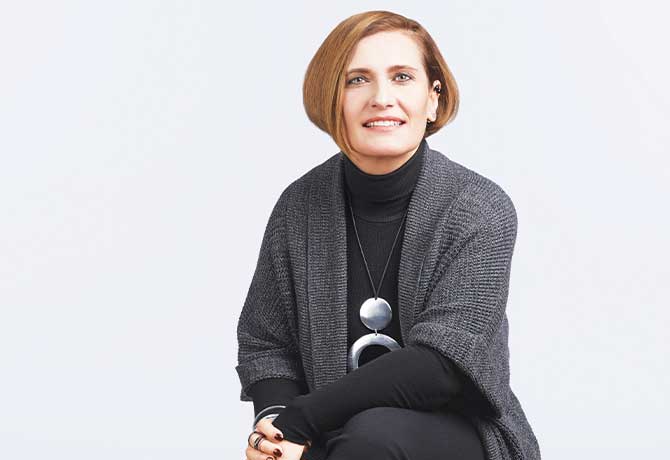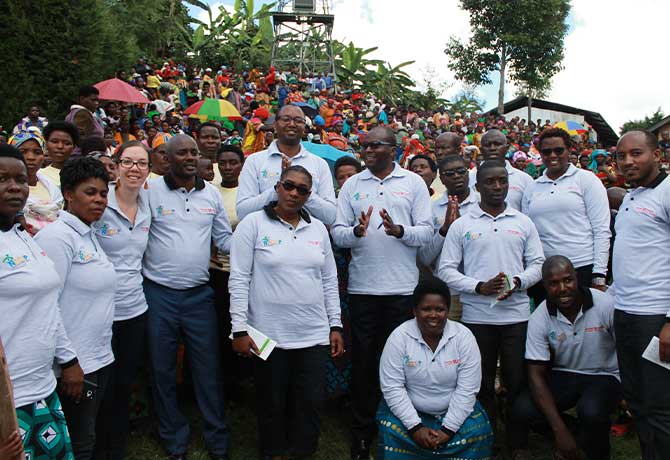
Graduate School of Biomedical Sciences at the Icahn School of Medicine at Mount Sinai
At the core of our success is our outstanding faculty—23 are members of the National Academy of Medicine and/or National Academy of Sciences—who encourage our students to think boldly, without boundaries, and to take measured risks that spur innovation.
Graduate School of Biomedical Sciences at the Icahn School of Medicine at Mount Sinai
At the Icahn School of Medicine at Mount Sinai and its Graduate School of Biomedical Sciences, we have vastly reimagined our advanced graduate education (PhD) and professional training (Master's) programs to give basic scientists and physician scientists the ability to develop the specialized skills they will need. Expanded educational endeavors in computing and big data, an exciting new global academic affiliation, and the creation of an Artificial Intelligence and Human Health center are among the opportunities shaping innovation in education, training, and discovery.
This report highlights:
- Message From the Dean
- Mount Sinai to Create World-Class Center for Artificial Intelligence and Human Health
- A 30-Year Legacy of Making a Difference in Public Health
- New Collaborative Opportunities at the Intersection of Engineering and Biomedicine
- An Effort to Publish Graduate Education Outcomes Data
- Three New Programs Aim to Improve Health and Well-Being
Message From the Dean
Medicine and health care are being transformed by automated processes, artificial intelligence technology, and massive computation of large collections of data, whether deriving from omics technologies—genomics, proteomics, transcriptomics, or metabolomics, for example—imaging, electronic medical records, clinical trial registries, sensors, or wearable devices.

At the Icahn School of Medicine at Mount Sinai, which includes its Graduate School of Biomedical Sciences, these diverse data are vigorously utilized in research efforts aimed at developing, testing, and implementing advanced computational approaches and robust analytics tools to characterize disease or health states at the individual level, ultimately to predict the best personalized treatments or preventive strategies. We are uniquely positioned to embrace these challenges.
Our exclusive collections of genomic samples, images, and longitudinal multiscale wellness, environmental, and social data are obtained from one of the largest and most population-diverse health care systems in the world. Our sizable community of computational/data science specialists in a number of areas, including computational genomics, computational biophysics, systems pharmacology, imaging, epidemiology, environmental medicine, and health information systems, continues to grow.
Educational endeavors in computing and big data analytics are expanding and now include opportunities at the Icahn Institute for Data Science and Genomic Technology. Our recently launched Biomedical Data Science Initiative offers outstanding computational training, including a new Master’s in Biomedical Data Science and a revitalized Genetics and Data Science PhD concentration. Bringing further excitement to our community is an affiliation with the Hasso Plattner Institute in Potsdam, Germany, and the creation of the Hamilton and Amabel James Center for Artificial Intelligence and Human Health.
This is our most recent path to innovation in education, training, and discovery. Come join us!
Mount Sinai to Create World-Class Center for Artificial Intelligence and Human Health
The Icahn School of Medicine at Mount Sinai in June 2019 announced that it is establishing a world-class center that will be among the first to integrate artificial intelligence, data science, and genomic screening within a stand-alone site. The Hamilton and Amabel James Center for Artificial Intelligence and Human Health will serve as a hub for some of Mount Sinai’s most talented researchers, enabling collaboration in unprecedented ways and encouraging the development of revolutionary technologies to diagnose, treat, and predict disease. Significantly, the Center is expected to open with approximately 40 principal investigators, and 250 graduate students, postdoctoral fellows, computer scientists, and support staff.
A new Center for Genomic Health to be located within the facility will use artificial intelligence to translate vast knowledge from deep databases of genomic information to accelerate the integration of genomics into clinical care throughout the Mount Sinai Health System. Insights gained into genomics, including single-cell genomic data, will also be combined with epigenomics, pharmacogenomics, and exposomics that will be integrated with patient health records and data originating from wearable devices to model the molecular, cellular, and circuit networks that facilitate disease progression. And, efforts to advance precision imaging will be guided by researchers from the Translational and Molecular Imaging Institute who aim to enhance the diagnostic power of imaging technologies and molecular imaging. They will explore algorithms to automate image interpretation and acquire images far more quickly, and at higher resolution. This effort builds on the considerable investment the School of Medicine has made in recent years in recruiting top data scientists, and in establishing a research culture increasingly focused on artificial intelligence, precision medicine, big data, and entrepreneurship.
A 30-Year Legacy of Making a Difference in Public Health

For the past four years, Katie Beck, MPH, has been making a difference in the lives of thousands of Rwandan children, applying skills and knowledge gained through the Master of Public Health program at the Graduate School of Biomedical Sciences at the Icahn School of Medicine at Mount Sinai.
A nutrition specialist with Partners in Health/Inshuti Mu Buzima (PIH/IMB), Ms. Beck is collaborating with government and industry partners on initiatives that are reducing acute malnutrition across the country. They include training programs for neonatal nurses and peer counselors that have increased the prevalence of exclusive breastfeeding among new mothers following hospital discharge. “During these projects, we saw a decline in mortality on the hospital neonatal units from 14 percent to 8 percent,” Ms. Beck says.
Her work exemplifies the Master of Public Health program’s 30-year legacy of excellence and impact. Launched in 1989 as a Master of Science in Community Medicine, which initially was only available to physicians, today’s program has evolved to offer current and aspiring public health professionals eight areas of specialization—General Public Health, Health Promotion and Disease Prevention, Environmental Health Sciences, Global Health, Outcomes Research, Biostatistics, Epidemiology, and Health Care Management—combined with 150 hours of applied practice experience and a culminating experience such as a master’s thesis or capstone project. Students and graduates have worked with organizations such as Doctors Without Borders, the International Rescue Committee, Action Against Hunger, the U.S. Centers for Disease Control and Prevention, and United Nations organizations such as UNAIDS and UNICEF.
“Our program is based on the core values of community, sound science, social justice, and engagement,” says Nils Hennig, MD, PhD, MPH, Director of the Master of Public Health program and Associate Professor, Environmental Medicine and Public Health, and Pediatrics. “The goal is to equip students with the necessary skills to empower communities, underserved populations, and individuals to advocate for and achieve better health outcomes.”
Students enrolled in Mount Sinai’s MPH program are drawn by the opportunity to train at the largest integrated health system in New York City and to work on initiatives that are improving health outcomes locally, nationally, and internationally. “Whether they are participating in Mount Sinai’s studies of 9/11 first responders, working with community organizations in East Harlem, New York, or evaluating malaria net use in Uganda as part of their practicum, we ensure they get a strong background in the science and core values of public health so they can build capacity and help make a difference,” Dr. Hennig says.
New Collaborative Opportunities at the Intersection of Engineering and Biomedicine
A partnership that includes a course exchange program and a collaborative research agreement was recently announced by the Graduate School of Biomedical Sciences at the Icahn School of Medicine at Mount Sinai and the Albert Nerken School of Engineering at The Cooper Union for the Advancement of Science and Art, both in New York City.
The initiative allows students from both schools to take courses for credit, and for both faculty and students to perform research at the other institution, providing matriculated Mount Sinai students access to world-class engineering resources at Cooper Union, and opening up unparalleled biomedical course and research opportunities at Mount Sinai to Cooper Union students. Research areas include, but are not limited to, bioengineering, biomedical engineering, proteomics, biomechanics, microbiome, and biomedical computational projects. The collaboration, which builds on the success of a less formal academic relationship that had been in place, was described by both institutions as a “spectacular opportunity” for faculty and students.
An Effort to Publish Graduate Education Outcomes Data
The Icahn School of Medicine at Mount Sinai is one of more than three dozen institutions that have committed to publicly releasing data on graduate education and training outcomes from their institutions. The effort was launched by nine research universities and a major cancer institute in December 2017 through the creation of the Coalition for Next Generation Life Science initiative that will collect and publish the data using common standards to better advise prospective PhD and postdoctoral candidates as they make choices about their ultimate training and career paths.
The metrics being reported include admissions and matriculation data of PhD students; median time to degree and completion for PhD programs; demographics of PhD students and postdoctoral scholars; median time in postdoctoral status at the institution; and career outcomes for PhD and postdoctoral alumni, classified by job sector and career type. Go to www.nglscoalition.org for current data.
Three New Programs Aim to Improve Health and Well-Being
The Office of Well-Being and Resilience—tasked in 2018 with developing and overseeing mental health and well-being initiatives at the Icahn School of Medicine at Mount Sinai—recently launched a number of programs at the Graduate School of Biomedical Sciences aimed at PhD students, master’s students, and postdoctoral trainees.
One initiative, a peer-mentoring program, is helping PhD students and postdoctoral trainees navigate challenges and expectations, equipping them with techniques for managing stress, and connecting them with the many mental health resources available through the Mount Sinai Health System. “These programs have already surpassed our expectations in terms of impact,” says Basil Hanss, PhD, Senior Associate Dean for Student Affairs and Career Development, and Associate Dean for Graduate School Well-Being and Resilience. “The postdoctoral program has evolved to include social activities such as monthly brunches, and that sense of community is helping to alleviate the isolation that postdoctoral trainees typically experience in their work.”
Postdoctoral trainees are also embracing Mindful Meetups, a pilot program that offers a safe space to discuss the academic and personal stressors they are experiencing. “The goal is to connect with and help individuals who would not have otherwise sought out this level of support,” says Sophia Piccolino, LCSW, OSW-C, Program Coordinator, Social Work Services/Oncology, The Mount Sinai Hospital. “I facilitate the discussions and offer tools and occasional activities such as pet therapy to decrease stress, but the intent is that through these conversations the participants will help each other by discussing what is on their minds.”
A third initiative, PEERS (Practice Enhancement, Engagement, Resilience and Support), is launching in pilot form for PhD students in fall 2019. Adapted from a curriculum developed for medical students, PEERS is a student-designed longitudinal curriculum that delivers tangible, evidence-based strategies for navigating stage-specific stressors. The strategies will be delivered mainly through facilitated small group sessions led by two upper-level PhD students and a Mount Sinai-licensed social worker.
“I am not aware of any other graduate program that has a required resilience training course to support students through the duration of their studies,” says Natasha Berryman, a PhD trainee in the Nash Family Department of Neuroscience and co-director of the PEERS program. “Our hope is that by providing data-driven interventions and helping students build the necessary language to talk about their experiences, we can bring them to a calm state so they can be strategic in the decisions they make and put themselves in a position for academic and professional success.”